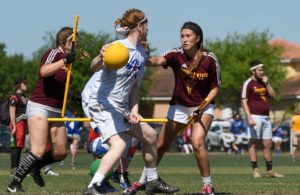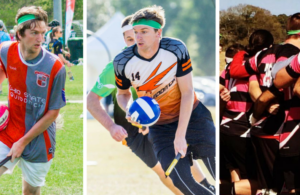- Rule, Britannia, no more?
- Unpopular Opinions: US Quadball Cup 2023
- Proven Contenders: University of Virginia
- Proven Contenders: Rutgers University
- Proven Contenders: University of Michigan
- Proven Contenders: Creighton University
- Different Perspectives: A Look Inside USA Ultimate
- Antwerp QC, Much of Belgian Core, Leaves Competitive Quidditch
Your Seeker is More Important Than You Think
- Updated: September 18, 2013

Porter Marsh, Steve DiCarlo, Keir Rudolph and Billy Greco are all notable players within the quidditch community. All are excellent seekers and widely viewed as the best in their respective regions. What I find interesting is that outside of the upper echelon of seekers, there doesn’t appear to be much of a focus on seeking. Most teams want their best player to either be a chaser, beater, or keeper and, in my opinion, such thinking is wrong.
Now, I’m not saying that you should rely 100% on your seeker for the ultimate result of the game, but the fact of the matter is that, as teams become more competitive, there will be situations in the future in which a team can be carried to a championship or even farther than most expected because of the play of the team’s seekers. A model for the future quidditch team should be something similar to a University of Texas or a Lost Boys Quidditch Club, where a team can put up triple digits in points, hold the opposition to half of that, and then have the elite seeker that will secure or save the team if all does not go according to plan.
Close games are very important and happen often. To look at how many close games occur in quidditch tournaments, below are pie charts that go through the last three Quidditch World Cup competitions, seperated by point different
World Cup IV had 23 bracket games within its tournament format. 
World Cup V had 35 bracket games within its tournament format.
World Cup VI had 35 bracket games within its tournament format.
The charts show that matches decided by snitch grab make up 52%, 60% and 49% of the games that are played during the World Cup brackets, respectively. Almost every other bracket game is decided by a grab, so for a team entering the tournament it is important to bring one or multiple seekers that are up to the task of winning games for their team
We can also look at seekers’ importance qualitatively by looking at the Cinderella runs of two teams at World Cup VI: Northern Arizona University and Bowling Green State University.
Northern Arizona University (NAU) was the sixth of seven Western teams to qualify for World Cup VI. Throughout the tournament, the team averaged 45.71 quaffle points per game and allowed 78.75 quaffle points per game, both among the lower percentiles of the tournament. But NAU was able to avoid a 1-3 pool play record by grabbing key catches against University of Ottawa and a 1-3 Florida State University squad. They were also defeated by Midwest Champion Marquette University 110 – 70*, although Marsh, their seeker, still caught the snitch at the end of the game. Entering the second day of play, NAU relied on their seeker and won in overtime with two snitch catches over the Silicon Valley Skrewts before defeating their Sweet Sixteen opponent Arkansas, by snitch catch after being down in the game by twenty points.
The run soon ended after that, as the physical and athletic Southwest Champion Baylor University overwhelmed NAU, winning by 100 points after a Porter Marsh snitch catch. But NAU was able to ride their seeker through close games, and he was the only seeker with a perfect record at World Cup VI. Thanks to Porter Marsh, a team that was all-around good but not over-the-top great was able to skyrocket into the Elite Eight of World Cup VI.
Bowling Green State University (BGSU) came into World Cup VI as the second place finisher at the Midwest Regional Championships. BGSU did not play up to their usual standard on the first day of the tournament and went 2-2, ending up seeded 31st going into bracket play. Bowling Green stepped up their play from there, and the wins started piling up. They held on for a 130*-100 play-in victory against Tennessee Tech, and then the fun began.
They upset University of Miami, holding the high-scoring Southern Champions to 50 points before winning via a snitch catch. Next up for BGSU were upsets of Maryland and the Lost Boys, both of whom had capable seekers in All-American Steve DiCarlo and the wrestler Harry Greenhouse, respectively. BGSU had made it to the Final Four after coming into bracket play as the 31st ranked team and thanks to the play of their entire team, BGSU’s seeking was set up to bring the team success. Both the teams above were able to ride a seeker, and even though overall Bowling Green State University had a better team that was efficient offensively, a good, balanced squad like NAU with an incredibly dominant seeker like Porter Marsh was able to squeeze through a couple games to reach the Elite Eight of the World Cup.
A skilled and reliable seeker is incredibly important to a team’s success. Yes, you need to surround that seeker with a solid team as BGSU did, but the fact is that in close games – which will occur often during a tournament – a team needs a DiCarlo, Rudolph, or Marsh to bring a team success. Seekers are the most important players in quidditch and will remain as such for the near future.
For more from Connor, check out his blog, Does He Look Like a Snitch




One Comment